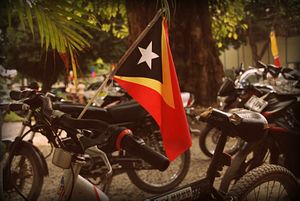Timor-Leste’s 15 years of independence have been marked by a mixed performance of progress and crisis. Having emerged from war and internal conflict in the late 1990s, Timor-Leste has a challenging path to get on par with other countries, in particular on issues related to development.
After 15 years of independence, it is time to take stock of how far things have come. The country’s presidential election will be held on March 20, with a potential second round of voting in April before the parliamentary election in July, the first such election to be held since the United Nations (UN) Mission departed in 2012.
Eight candidates, including one female candidate, will be contesting the March 20 presidential elections after fulfilling the criteria, including securing enough supporters. The eight candidates are Amorim Vieira, Angela Freitas, Antonio da Conceição, Antonio Maher, Francisco Guterres Lu-Olo, Jose Luis Guterres, Luis Alves Tilman, and Jose Antonio Neves. All eight candidates are scheduled to carry out their political campaigns from March 3-17. Voting is scheduled to take place simultaneously on March 20 both inside the country and overseas for Timorese abroad.
Out of a population of approximately 1.2 million, as reported by the Secretariat for Technical and Electoral Administration (STAE) recently, there are over 747,000 registered voters, with a further 1,332 overseas voters expected to take part in both the presidential and parliamentary elections.
This upcoming March 20 presidential election is an important test of Timor-Leste’s stability. There’s reason to be hopeful: the Democracy Index 2016, as published by the Economist Intelligence Unit (EIU) in January this year, ranked Timor Leste as the most democratic country in Southeast Asia based on five variables — electoral process and pluralism, the functioning of the government, political participation, political culture, and civil liberties. Overall, Timor Leste’s score was impressive: besides being first in Southeast Asia, it was fifth in Asia and 43rd out of all the countries assessed by the EIU. A December 2016 nationwide poll by the International Republican Institute’s (IRI) similarly has generally painted an optimistic lens on the country’s future prospects.
However, as Southeast Asia’s youngest country, Timor-Leste remains a complicated and paradoxical case. As an oil-rich country, the relationships between democracy and development remain far from universally positive. Natural resources undoubtedly play a crucial role in the economy of many countries and it is even more important for a post-conflict small state like Timor-Leste. However, whether the on-balance contribution to development is positive or negative remains a contested debate. In this regard, Timor-Leste faces the challenge of balancing between resource dependence and democracy.
Looking back over the past decade, Timorese politics have been thus far notable for their dynamic political competition. Since the restoration of independence in 2002, Timor-Leste has had three sets of highly competitive elections that have been universally recognized as free and fair. Even when tensions were high in the wake of the 2006 political crisis, presidential and parliamentary elections were held in 2007, albeit with several incidents.
As stipulated in the the Timor-Leste constitution, the third objective of the state shall be “to defend and guarantee political democracy and participation of the people in the resolution of national problems.” Democracy has a broad meaning; it encompasses rule of law, independence, freedom, self-reliance, and most importantly, the political will to achieve and keep the above values. But that spirit risks running low after 15 years of independence thanks to the continuous domestic challenges that impact the Timorese people’s daily lives.
Timor-Leste has tremendous opportunity for development. After going through such a traumatic independence struggle, the people’s expectations are high. While the constitution stipulates that the state will be institutionalized at distinct levels, the issue is its actual competency and resources are not adequately addressed.
What remains missing is the promotion of the decentralization of political power, aimed at empowering the Timorese people at the grassroots level for self-governance and self-reliance, so as to enable them to build their capacity for socio-economic development. Having said that, ahead of the much-anticipated presidential election on March 20, renewed efforts on democratic decentralization should be emphasized by the presidential candidates so that marginalized groups can be empowered.
In this regard, Timorese political leaders should find solutions to move toward sustainable democracy in the midst of challenging conditions such as poverty, land right issues, illiteracy, low employment, corruption, and cronyism. Ahead of the upcoming presidential election, it is crucial that Timorese political leaders to seize upon the existing popular goodwill to address the issues of greatest concern to citizens, and take steps to address the complex issue of linking democracy and economic reforms for the country’s still-young population.
Khoo Ying Hooi (PhD) is Senior Lecturer at the Department of International and Strategic Studies, Faculty of Arts and Social Sciences, University of Malaya.

































